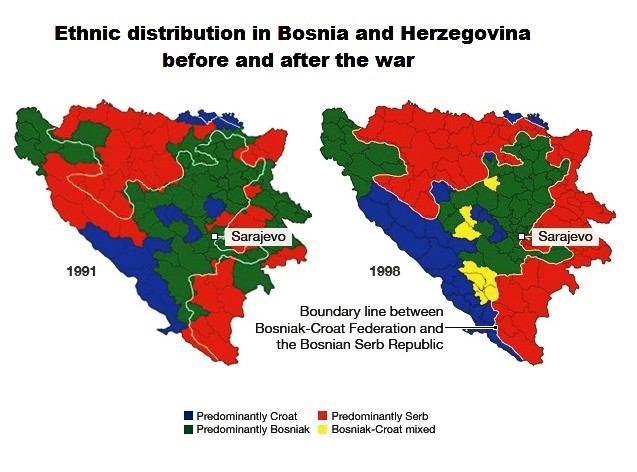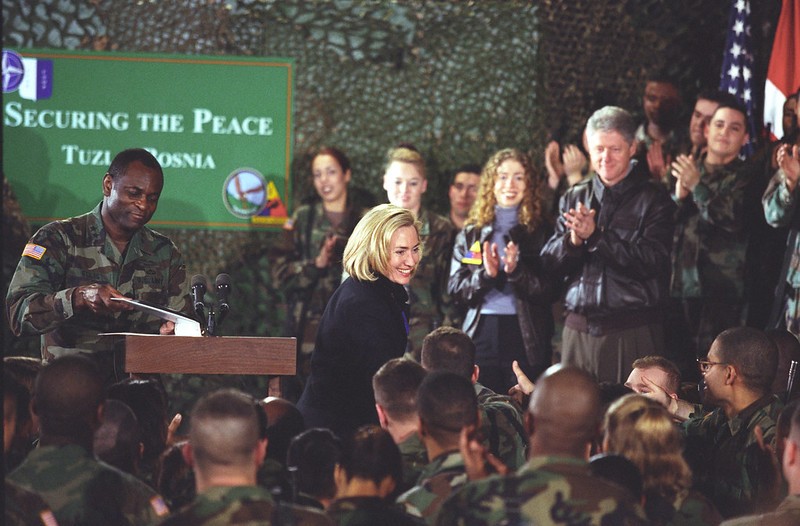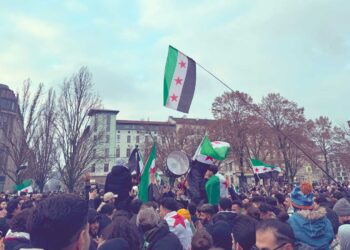In late March, a court in Sarajevo issued an arrest warrant for Bosnian Serb leader Milorad Dodik, convicted of attacking the constitutional order and ignoring rulings made by the country’s international envoy.
In response to the verdict, Dodik urged his supporters “not to worry” and called the conviction “nonsense”.
Dodik had fled earlier to neighbouring Serbia which is experiencing some of the largest anti-government protests in Europe for over 40 years against the government led by Aleksandar Vučić. Dodik meanwhile has been scrambling for foreign support, highlighted by a photo-op with Israeli Prime Minister Benjamin Netanyahu at an antisemitism conference in Israel where he stated the unwavering support of the Republika Srpska to Israel.
He then arrived in Moscow, apparently fearful of the request made by Bosnian officials to issue an Interpol red notice — thereby permitting his international arrest. Threats of consequence are unlikely to dissuade Dodik, a career-politician well-seasoned in the weaponization of bureaucracy.
One of many antagonists in the region, he’s a symptom of a larger political alignment which scoffs at democratic ideals.
Ethnic Lines
Bosnia and Herzegovina comprises three main ethnic groups: Bosnian Muslims (referred to as Bosniaks), Catholic Croats and Orthodox Serbs. The country contains two autonomous entities – a joint Bosniak-Croat federation, as well as a Serb republic (Republika Srpska). The governance structure of Bosnia, created on the tails of an independence war which ended in 1996, has produced numerous challenges.
Its governance is administered through a direct tripartite presidency that operates on a rotational basis; switching every eight months between the Bosniak, Serb and Croat members, with one nominated as Chairperson. This process is regulated by the Office of the High Representative, an international envoy that oversees the implementation of the Dayton Agreement, which carved the country along ethnic lines following the war.
The three-sided structure has meant leaders are unable to exercise worthwhile control as their mandates end too soon — hence the 19 different presidents despite the country only declaring independence in 1992. Capitalizing on this, Dodik and his allies repeatedly threaten secession, and maintain a complete disregard for the rulings of the High Representative.

A Red-Stained Past
After World War two, Bosnia was part of the Socialist Republic of Yugoslavia, a Communist state ruled by Josip Broz Tito for nearly 40 years. Yugoslavia was made up of six republics including Bosnia, Croatia, Macedonia, Montenegro, Serbia and Slovenia. Under Tito’s authoritarian rule, Bosnia remained relatively undisturbed and functioned primarily as an industrial society for arms production. Though set up as an equal polity for the Bosnian Muslims, Croats and Serbs, inequalities persisted and certain constituent people’s were persecuted.
After his death in 1980, suppressed ethnic divisions were more freely able to emerge as the Yugoslav regime had cracked down on independence movements. These echoed the wishes of the two more prosperous republics, Croatia and Slovenia, for greater decentralization and a desire not to subsidize poorer parts of the union.
This was to the chagrin of the Yugoslav government and its leader Slobodan Milosević, who monopolized power in Belgrade and heavily relied on funds accumulated outside of Serbia. After citizens in the two Westernmost republics voted overwhelmingly for independence, the fate of the Yugoslav project was sealed.
Slovenia left rather simply, by Yugoslav standards, owing to its ethnic homogeneity. Bosnia and Croatia’s secessions were more brutal, involving wars that claimed the lives of 100,000 and 22,000 people. In both instances, Bosniaks and Croatians fought the Serb-dominated Yugoslav army in addition to factions of Serb separatists.
Ethnic cleansing was commonplace, with the vast majority of crimes perpetrated by Bosnian Serb and Serb paramilitary forces, including the genocide in Srebrenica which killed over 8300 Bosniak men. During the conflicts, Croatia took in the largest number of refugees, most of whom were of Bosniak and Croat origin. Some stayed and others went on to resettle in Western Europe, particularly in Austria, Germany and the U.K.
Western governments were decried for not intervening sooner as Srebrenica had been designated a “safe area” under the control of United Nations Protection Force (UNPROFOR). Lesser-publicised crimes include the systemic wartime rape of over 30,000 people (mostly women), and the imprisonment of Bosniaks and Bosnian Croats in concentration camps such as Omarska and Trnopolje.
A survivor from Omarska recalled that “[at night] 20-40 were killed [by] knife, hammer and burning”, she continued, “it sounded as if wood were being shattered, but those were bones that were being broken.”
After numerous safe zone violations, attacks on civilians and the utilization of UN peacekeepers as human shields, NATO responded with a series of air strikes on Bosnian Serb positions. This coupled with the Croat-Bosniak military offensive that was halted at Banja Luka, forced the Serbs to return to the negotiating table and sign the Dayton Accords.
The agreement was criticized for rewarding the aggression of the Serbs and allowing them to obtain the upper hand in political negotiations — they control their own entity whereas the Bosniaks and Croatians share a federation. Additionally, criticism is levied at the electoral structure which permits ethnic groups to corrupt the structure that allows for guaranteed representation.
The intensification of distrust in government combined with an inept judiciary has sanctioned further division among ethnic groups. Epitomized by the case of Srđan Golubović, a member of the vicious paramilitary organization, Serb Volunteer Guard. Nicknamed Arkan’s Tigers, after mobster Željko ‘Arkan’ Ražnatović, the group was indicted on crimes against humanity including rape, executions, starvation leading to death and forced expulsions.
Golubović was infamously photographed kicking Tifa Šabanović, an elderly Bosnian Muslim woman, in the head as she lay dying on the pavement alongside two neighbours. Golubović was ‘reprimanded’ by his command unit once the pictures were publicized, and currently plays as a DJ in Belgrade dance clubs under the pseudonyms ‘DJ Max’ and ‘XperimenT’.

You think we should intervene now?
The term ‘ethnic cleansing’ refers to the mass expulsion or killing of members of an ethnic or religious group. It was first utilized in major Western media to describe how ethnic Croats were being driven out of Serb-majority villages in Croatia shortly after their war began in 1991. Thereafter it became more broadly attributed to include such crimes occurring in Bosnia and Kosovo.
The failure of the international community to respond urgently against the Yugoslav Army during the Croatian War emboldened the Bosnian Serbs to attempt the same methods to expel Muslims and Croats from Bosnia. From 1993 till 2017, a criminal tribunal was set up to deal with the war crimes committed during the Balkan wars. This International Criminal Tribunal for the former Yugoslavia (ICTY), found Serbs guilty 69% of the time, Croats 20% and Bosniaks 5%.
Of the former Yugoslav countries that experienced largescale conflicts, Bosnia, Croatia and Kosovo have been somewhat proactive in providing compensation for wartime rape. Croatia enshrined a bill into law in 2015 which carried significance due to the drawing of compensation funds directly from the national budget. In most cases however, hardly any country has provided sufficient support – monetary or otherwise, for victims of crimes committed by their own soldiers.
Meanwhile, sentences for those convicted of wartime sex crimes can be repulsively low — the commander of a prison where one woman was repeatedly raped and tortured for over three months only received four-and-a-half years in prison. The minimum sentence of five years for war crimes remains meaningless in Bosnian courts considering it can be mitigated by a guilty plea, family status or a clean criminal record. Even more obscenely, war criminals have the ability to buy out their sentences if under 12 months, for as low as 100 Bosnian marks (around 58 USD).
While the administration in Sarajevo is culpable for many issues, the international alliances in NATO and the EU must shoulder primary responsibility for policy shortcomings. Western politicians during the 1990s occupied themselves with protecting their own status in government, an approach which facilitated genocide.
The Americans under George H.W. Bush debated mind-numbingly whether the conditions in the concentration camps were dire enough to warrant intervention. Intervention was heeded until the last possible moment, after mass casualties had already occurred. The Dayton Agreement, spearheaded by Bill Clinton, remains a complete failure, as admitted by him at a Gala night in 2018. An acknowledgment of wrongdoing would’ve gone further than his wife’s farcical war-stories about landing in Bosnia under direct fire.
Leaders in Europe fought to keep the arms embargo in place — claiming it would embolden other countries such as Russia to further arm the Serbs. A farcical claim in and of itself as Russia had supplied Croatia with arms through various businessmen, such as Zvonko Zubak. Concerns regarding Serb military domination maintained no basis in reality as they already controlled the fourth-largest army in Europe at the time. The dynamic duo of British Lord David Owen, the European Community’s negotiator, and Canadian Major General Lewis MacKenzie, chief of staff for the UN’s peacekeeping force, displayed unwavering bias towards the Serb leadership. Owen developed a personal friendship with Slobodan Milosević and wife Mira — a continuation of British infatuation with Serbian powerbrokers and high society.
Likewise, in 2019, General MacKenzie attended a book fair in Belgrade, where he promoted his book that paints the Bosnian Muslims as the aggressors. His credibility seemingly in tatters is compounded by revelations of survivor accounts that he was present at the “Kod Sonje” [‘Sonja’s house’] rape camp located in the Sarajevo suburb, Vogošća.

Appeasement towards the Serbs, overtly, and through the Dayton Agreement has legitimized the humiliation of victims and worsened ethnic tensions. Segregated schools and the glorification of convicted war criminals reveal the results of favouritism in Western foreign policy. The latter was characterized by Radovan Karadžić, president of the Bosnian Serb republic during the war, who inspired the Christchurch mosque attacker. The ease with which he was allowed to evade capture for nearly 13 years, revealed that the international community did not prioritize the victims of certain crimes, including genocide.
The issues occurring in Bosnia that Western leaders seem so eager to resolve, are the very same ones their predecessors crafted. Early last year, the EU’s Commissioner for Human Rights dispatched letters to the Prime Ministers of all former Yugoslav states urging them to “move toward social cohesion, justice and reconciliation,” An insult to all those citizens scarred with the memories of conflict, who begged them to intervene or provide safeguards during the implementation of the Dayton Agreement.
Upon inspection, the recommendations read akin to a Kardashian’s birthday list; horrendously unrealistic and utterly detached from sanity. The legacy of interventionism in the former Yugoslavia will remain tainted with the inability of the international community, particularly those in the UN and NATO, to remain impartial and prioritize the rights of victims.
Preventing a repeat
Milorad Dodik remains a credible threat to the stability of Bosnia, however his legitimacy stems from a lack of accountability by Western leaders and the silence regarding reforming the Dayton Agreement. Without these admissions, those same citizens they claim to want to aid, will bear the brunt of Dodik’s threats. To compound matters, there’s a Russian-aligned neighbor in Serbia, who’s president actively promotes textbooks which downplay any crimes committed by Serb forces including ethnic cleansing and genocide.
Foreign governments must be prevented from harnessing post-conflict frustrations to further their own ideals such as Saudi Arabia and Turkey who’ve heavily invested in the construction of mosques in Bosnia. Their goal is promoting Wahhabism, a puritanical sect of Islam with a strict adherence to religious scripture including the Quran. Their aims should be heavily scrutinized since Bosnian Muslims have practiced a secular version of Islam for centuries. In his book, The War is Dead, Long Live the War, Ed Vulliamy outlines how Bosniak refugees in the U.K. were admonished for not adhering strictly enough to the religion. Sefer Kararić, a Bosniak refugee from Kozarac recalled “they [the Muslim charity] were hard line … pressuring [my wife] and her parents to stop drinking and go to [the] mosque”. He continued “[my father in law said] fucking hell Sefer, I haven’t had a brandy since I got here”. Numerous experiences detailed by Vulliamy disclose how charities and social workers viewed refugees — as dull invalids who needed to be moulded to a set of beliefs, or taught how to open a fridge door.
Civil society organizations, such as Documenta in Croatia, have been almost opaque in attempting to reconcile visible grievances and seek to prioritize a narrative of uniform guilt. Whatever they seek to achieve, it is not in the name of empowering survivors, but instead increasing their own political platitudes. Thankfully, mass graves, live reporting and witness testimony will never be entirely erased.

As the world squares itself with new diplomatic parameters, many are curious how we arrived along such fractured boundaries. The failure to hold past crimes to account has condemned a nation from the offset. The over usage of dialogue encouraging peace among political actors has not proven useful. Peace is not something you can bestow upon anyone, the same way you would with an honorific title.
Providing the conditions for peace, an arduous task in itself, will not work without the removal of geopolitical opportunists. Creating agency as opposed to international relief might provide better results. For this to happen, the Dayton Agreement must be disposed of, the way you would with a rotten pear. Launched farther into the distance than one could imagine, and perhaps that’s not far enough.
Denial among Westerners who advocate for reform is spirited, hellbent on forming a mini-Yugoslavia so they may one day fulfill their goal of marginalizing the South Slavs to such a degree that all their resolve is broken. Determinations must be made which enshrine the language, political and religious protections for all ethnic groups and prevent partisan thespians from using the system against itself.








